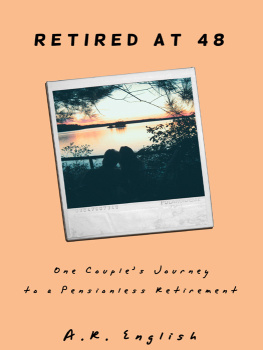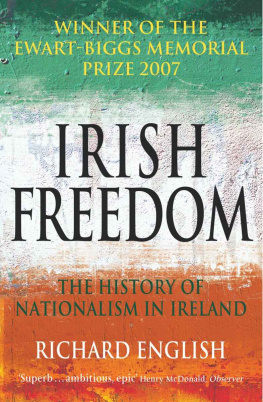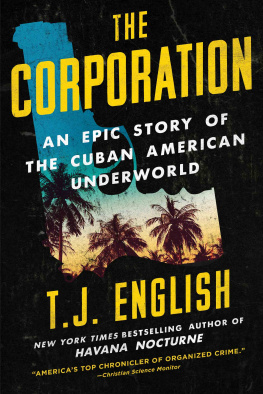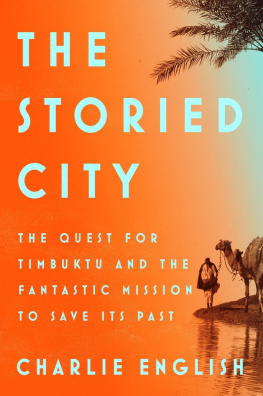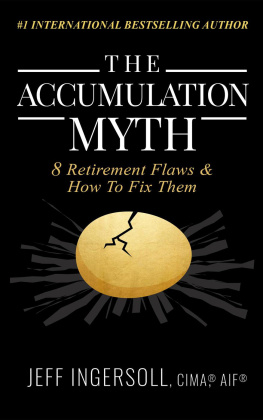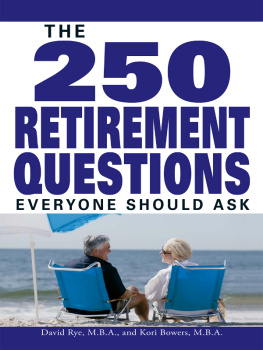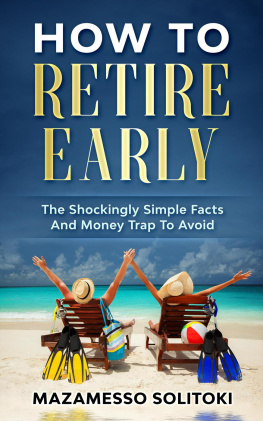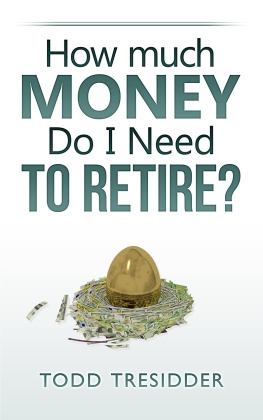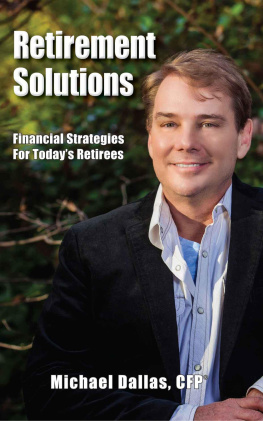
Copyright 2013 A.R. English
Published by Iguana Books
720 Bathurst Street, Suite 303
Toronto, Ontario, Canada
M5S 2R4
All rights reserved. No part of this publication may be reproduced, stored in a retrieval system or transmitted, in any form or by any means, electronic, mechanical, recording or otherwise (except brief passages for purposes of review) without the prior permission of the author or a licence from The Canadian Copyright Licensing Agency (Access Copyright). For an Access Copyright licence, visit www.accesscopyright.ca or call toll free to 1-800-893-5777.
Publisher: Greg Ioannou
Editor: Andrea Douglas
Front cover design: Jane Awde Goodwin
Book layout and design: Stephanie Martin
English, A. R., 1963
Retired at 48 [electronic resource] : one couples journey to pensionless retirement / A.R. English ; editor, Andrea Douglas.
Electronic monograph issued in various formats.
Also issued in print format.
ISBN 978-1-927403-47-1 (EPUB)
1. Retirement income--Canada--Planning. 2. Finance, Personal--Canada. 3. English, A. R., 1963-. I. Title. II. Title: Retired at forty-eight.
HG179.E54 2013 332.0240140971 C2012-908584-7
This is an original electronic edition of Retired at 48: One Couples Journey to a Pensionless Retirement.
List of Figures
Introduction
We are a middle-aged married couple living in Toronto, without children, in a mortgage-free home. We each had successful professional careers, but it had always been our goal to retire early. By retirement, we mean no longer having to work anymore, ever. We do not mean trading in an initial career to take on a less-demanding or less-stressful job, probably for less pay. Work never defined us and was merely a way to make money so that we could enjoy life. There was so much that we wanted to do, but there was never enough time on the weekends or on our all-too-brief vacation days. So the sooner we could dispense with work and get on with life, the better.
Unfortunately, neither of us was forward-thinking or wise enough to pick a career that would provide us with an actual pension that blessed concept where once you retire, your employer would continue to pay you a regular sum of money for the rest of your life. We each had a locked-in defined contribution RRSP to which our company would contribute only while we were still working. So our retirements would have to be funded from these meagre and insufficient sums, along with whatever we could save on our own. The money we accumulated when we walked away from our jobs would have to last us for the rest of our lives.
This was a daunting prospect, fraught with risks and dangers. How would we know whether we would have enough money to last our lifetimes? How long would we live? How would inflation affect us? What would the markets do? Much thought, research and careful planning would have to go into our retirement preparations.
We are by no means financial experts trying to offer advice or provide the magic answer. We didnt win the lottery. We didnt inherit a pile of money. We didnt invest in Apple or Google at rock-bottom prices and make a killing. Rather, we are just two reasonably intelligent, extremely motivated people who had a common goal and worked hard to achieve it.
We have been asked by so many people how we were able to achieve early retirement that we thought it would be best to write about our experiences. Our specific personal circumstances and situation probably wont apply exactly to everyone else. But some of the general concepts that we followed, our thought processes, and the practical descriptions and examples of what we did and how we did it just might be useful. Regardless of whether early retirement is in the cards or not, anyone without a pension needs to consider what amount of savings is required to retire on and whether that amount will last his or her expected lifetime.
The following recounts our path to achieving early retirement without a pension at age 48.
Dedication

This book is dedicated to Jean Allen English, an extraordinary woman who was ahead of her time.
Born in 1887, Jean Allen was the eldest of eight children living on a farm in Comber, Ontario. At the age of 14, she overheard her parents describe her as the homely one that would probably never marry and therefore would stay on the farm to take care of them. As an intelligent, determined and self-sufficient adolescent, Jean was not prepared to accept this fate planned for her. Shortly after, she left home, got herself trained as a telegraph operator, and moved from job to job across Ontario. Jean was very skilled in her work and gained the reputation as one of the top telegraphers of either gender.
In 1915, Jean moved to the Patterson Grain Company on the Winnipeg Grain Exchange. While there, she began trading stocks for the company and once cornered the market in barley. Using the investment experience gained on the job, Jean made wise personal trades as well. By 1920, she was the highest paid woman on the grain exchange, owned several houses, and drove a Model T Ford. This was a rare and impressive accomplishment for a woman to achieve in that era.
Overworked and requiring a vacation, Jean decided to buy a remote 4-acre island on Lake Minnitaki, Ontario, as a vacation property. She commissioned a log cabin to be built on it and travelled by boat from Sioux Lookout, Ontario, to reach it each summer. One day while Jean was at the island, she had a visitor. Homer English, a superintendent with the Canadian National Railway was in the area to inspect railway districts. Upon hearing of this unusual woman who owned an island in the wilderness, Homer wanted to check it out. Romance bloomed, the two were married in 1925, and they had one child together.
Jean retired after marriage, as women were expected to do in those days, but she continued on with her wise investments and did quite well. After Homer retired, their family lived largely on these investments and used them to put their son through university.
Grandma Jean has been an inspiration to us, and by her example, showed us the value of financial independence. English Island is still in the family, and four generations have continued to make regular treks to vacation there. Now that we are retired, we will have even more time to spend up there, enjoying her legacy.
What Type of Retirement Do We Want?
Before we could calculate how much money we would need to support our retirement, we had to determine what we wanted our retirement to be like. We knew we didnt want to have to stay home and eat Kraft Dinner every night, but we had to be realistic and pick a scenario that would make us happy and still be achievable.
We realized that if we wanted to live a jet-setting lifestyle even though we had not had the foresight to be born into a family with the last names of Gates, Buffett or Jolie-Pitt, then early retirement was probably not in the cards. On the other hand, there were articles indicating that if we were willing to move to the Philippines, we could live quite well on $800 per month, and we could probably have retired years ago. Our plans were somewhere in between these two extremes.
We considered whether we wanted to live in another city, or another home. We had friends who planned to downsize from their large homes to smaller accommodations, or move to a smaller town with a slower pace, or live full-time at their summer cottages, or even relocate to Europe for a total change of lifestyle. Luckily we already owned our perfect, mortgage-free condo in a city and location that we loved, and could not imagine living anywhere else. We needed to make no changes in this respect. Unfortunately, this also meant that we would not be able to count on any cost savings or influx of capital that would result from downsizing our accommodations.

